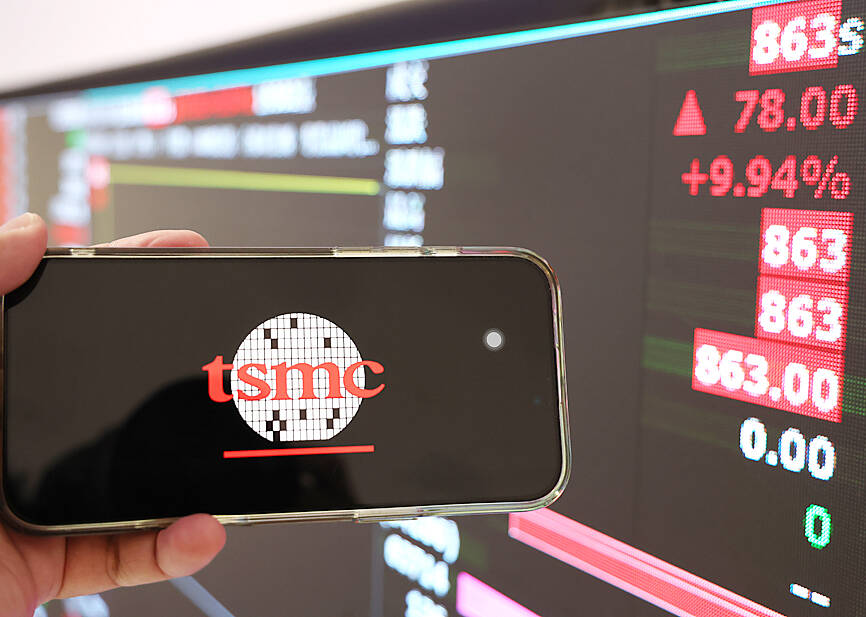Taiwan Semiconductor Manufacturing Co’s (TSMC, 台積電) quarterly revenue rose a larger-than-anticipated 41.6 percent from a year earlier, reflecting strengthening demand for artificial intelligence (AI) servers and smartphones before US tariffs kicked in.
That marked TSMC’s fastest pace of growth since 2022. Electronics manufacturers had stockpiled goods in US warehouses in anticipation of potential trade and shipping disruptions.
The main chipmaker for Apple Inc and Nvidia Corp yesterday reported revenue of NT$839.25 billion (US$25.5 billion) in the first three months of this year. Analysts on average expected roughly NT$830.5 billion.

Photo: CNA
Last month alone, TSMC’s revenue was NT$285.96 billion, up 46.5 percent from a year earlier and a record high in the company’s history.
The company is to report full quarterly earnings on Thursday next week, along with its outlook for the current quarter.
US President Donald Trump’s 90-day pause on higher tariffs might mean more stockpiling in the months ahead, shoring up TSMC’s June quarter, according to Bernstein analysts led by Mark Li.
“We think AI demand, despite some recent noises, will still grow notably year-on-year,” they said in a note to investors.
Shares of TSMC closed up 9.94 percent in Taipei trading yesterday.
TSMC’s results coincide with growing concerns about how tariffs may disrupt demand for electronics such as iPhones. Over the weekend, Americans rushed to pick up Apple’s marquee device, fearing it may raise prices to cover the additional cost.
Some analysts said TSMC might have to cut its full-year revenue target for growth in the mid-20 percent range, reflecting global uncertainty and the potential hit to economies. The company’s outlook is overshadowed also by Trump’s threats to slap tariffs on semiconductor imports, although it is unclear when or whether that might happen.
Still, TSMC remains the world’s leader in the production of advanced semiconductors used for AI devices and smartphones. That could cushion the impact of tariffs or trade disruptions.

STEEP DECLINE: Yesterday’s drop was the third-steepest in its history, the steepest being Monday’s drop in the wake of the tariff announcement on Wednesday last week Taiwanese stocks continued their heavy sell-off yesterday, as concerns over US tariffs and unwinding of leveraged bets weighed on the market. The benchmark TAIEX plunged 1,068.19 points, or 5.79 percent, to 17,391.76, notching the biggest drop among Asian peers as it hit a 15-month low. The decline came even after the government on late Tuesday authorized the NT$500 billion (US$15.2 billion) National Stabilization Fund (國安基金) to step in to buoy the market amid investors’ worries over tariffs imposed by US President Donald Trump. Yesterday’s decline was the third-steepest in its history, trailing only the declines of 2,065.87 points on Monday and

TAKING STOCK: A Taiwanese cookware firm in Vietnam urged customers to assess inventory or place orders early so shipments can reach the US while tariffs are paused Taiwanese businesses in Vietnam are exploring alternatives after the White House imposed a 46 percent import duty on Vietnamese goods, following US President Donald Trump’s announcement of “reciprocal” tariffs on the US’ trading partners. Lo Shih-liang (羅世良), chairman of Brico Industry Co (裕茂工業), a Taiwanese company that manufactures cast iron cookware and stove components in Vietnam, said that more than 40 percent of his business was tied to the US market, describing the constant US policy shifts as an emotional roller coaster. “I work during the day and stay up all night watching the news. I’ve been following US news until 3am

Six years ago, LVMH’s billionaire CEO Bernard Arnault and US President Donald Trump cut the blue ribbon on a factory in rural Texas that would make designer handbags for Louis Vuitton, one of the world’s best-known luxury brands. However, since the high-profile opening, the factory has faced a host of problems limiting production, 11 former Louis Vuitton employees said. The site has consistently ranked among the worst-performing for Louis Vuitton globally, “significantly” underperforming other facilities, said three former Louis Vuitton workers and a senior industry source, who cited internal rankings shared with staff. The plant’s problems — which have not

TARIFF CONCERNS: The chipmaker cited global uncertainty from US tariffs and a weakening economic outlook, but said its Singapore expansion remains on track Vanguard International Semiconductor Corp (世界先進), a foundry service provider specializing in producing power management and display driver chips, yesterday withdrew its full-year revenue projection of moderate growth for this year, as escalating US tariff tensions raised uncertainty and concern about a potential economic recession. The Hsinchu-based chipmaker in February said revenues this year would grow mildly from last year based on improving supply chain inventory levels and market demand. At the time, it also anticipated gradual quarter revenue growth. However, the US’ sweeping tariff policy has upended the industry’s supply chains and weakened economic prospects for the world economy, it said. “Now